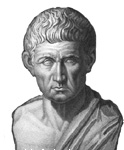Chapter 2. "Art As Idealization" by Aristotle

Aristotle adapted from University of St. Andrews
About the works …
These short selections relating to Aristotle's Šsthetics are taken from Nicomachean Ethics,[1] Metaphysics,[2] Poetics,[3] and Rhetoric.[4] Where Plato plied imaginative insight, Aristotle sought method, classification, and evaluation. Aristotle, as Plato does, argues that the origin of the artistic impulse is imitation. Yet, he thinks that art seeks the universal in the individual representation; hence, art is, in a sense the idealization of nature. Thus, good art does not "just" copy nature. The various arts are distinguished, he thinks, according to the means of rhythm, language, and harmony. The notion of katharsis[5] is essential to mimesis as the pleasure derived from an essentially cognitive process. For him, art is the product, not the creative process, whose source is intellectual desire and whose effect is more intellectual than emotional. The import of these short reading selections continue to be elucidated in contemporary Šsthetic debates.
Ideas of Interest from Aristotle's Ăsthetics
Explain what Aristotle means when he states that the master of any art seeks excellence through the intermediate relative to us, not the object. What kind of mean forms the standard of good art?
What is Aristotle's argument against Šsthetic relativity?
How does Aristotle distinguish between the good and beautiful? Does Aristotle believe beauty has a formal cause?[6]
According to Aristotle what do the various forms of poetry, music, and dance have in common? And how do they differ?
How does Aristotle account for the origin of poetry? Is poetry's origin essentially emotional or intellectual? What, according to Aristotle, is the pleasure appropriate to tragedy?
Why does Aristotle consider poetry more philosophical than history?
What are the main factors Aristotle enumerates as subject for criticism in poetry?
What does Aristotle mean when he notes that beauty is relative to the individual in terms of life-span. Is the selected passage from the Rhetoric an instance of Šsthetic relativism?